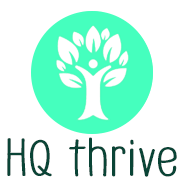What is HQ Thrive?
HQ Thrive - Upper Primary
– a wellbeing tool kit for teachers and students.
HQ Thrive provides valuable positive psychology activities in practical bitesize lessons, that are designed to be sequenced, active, focused and explicit (SAFE: Durlak, Weissberg, Dymnicki et al, 2011)
HQ Thrive brings together positive psychology and education. Fundamentally positive education seeks to fulfill human potential by promoting generative relationships, by supporting agency and choice and by scaffolding and acknowledging competence. HQ Thrive is designed to be used within a positive education school culture, or within a school actively seeking to make change towards a positive education culture.
HQ Thrive draws on research into emotions, the mind body connection, mind-based strategies for emotion regulation (cognitive-behaviour approaches and thinking choices), body-based strategies for emotion regulation (physical approaches such as mindfulness and meditation), character strengths and relationships.
HQ Thrive lessons provide a tool kit for teachers and students. Within each section there are a variety of activities to suit a variety of school, class and individual contexts. Activities also vary in complexity and assumed knowledge, to meet the needs of students at different points in their wellbeing literacy journey.
How are Australian students going, wellbeing wise?
Every three years the Organisation for Economic Co-operation and Development (OECD), uses PISA to measure the ability of 15 year old students to use their science, reading and maths knowledge and skills. For the first time in 2015, PISA also measured student well-being. To measure well-being teenagers were asked about their sense of belonging at school and about their relationships with peers and teachers, their home life and their time outside of school (OECD, 2015). On average across OECD countries, 63% of low-achieving students in science (students in the bottom quarter of science performance in a country) and 46% of high-achieving students (students in the top quarter) reported that they feel anxious for a test no matter how well prepared they are. Australian teenagers ranked below the OECD average in sense of belonging at school and above the OECD average for school-work related stress.
If a certain amount of tension or concern is essential to motivation and high performance, too much pressure can be counterproductive for a child’s cognitive development and psychological well-being. Both teachers and parents have to find ways to encourage students’ motivation to learn and achieve without generating an excessive fear of failure. https://www.oecd.org/pisa/PISA-2015-Results-Students-Well-being-Volume-III-Overview.pdf
Results showed that teenagers who feel part of a school community and enjoy good relations with their parents and teachers are more likely to perform better academically and be happier with their lives (http://www.oecd.org/australia/pisa-2015-australia.htm accessed 14 August 2017)
When it comes to wellbeing the good news is that:
Our country cares: Mental health is one of Australia’s health priority areas http://www.aihw.gov.au/national-health-priority-areas/.
Our Department of Education cares: The Australian Curriculum lists among general capabilities: ‘Personal and Social Capability involving self-management, self-awareness, social management and social awareness’.
Our cities care: Melbourne Declaration on Educational Goals for Young Australians specifies the objectives of our students becoming confident and creative individuals, who are active and informed citizens http://www.curriculum.edu.au/verve/_resources/National_Declaration_on_the_Educational_Goals_for_Young_Australians.pdf
Our teachers care: ‘I see it as one of the biggest things you can possibly do for kids because they won’t learn unless they feel safe, supported and included, and if we can provide that at school … we can have good outcomes for them in the future.’ Primary School Teacher, Victoria, Australia.
Positive psychology and positive psychology interventions provide some helpful approaches and strategies: Positive psychology offers an increasingly well supported approach to improving wellbeing. HQ Thrive brings many of these together in an accessible and practical package.
